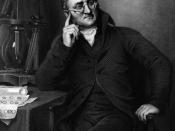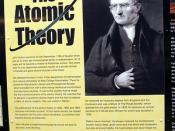John Dalton was born in England in 1766. He was the son of a weaver and attended a Quaker school. He was intelligent at a very early age; he even began teaching at the Quaker school at the age of 12. Unfortunately, the wages were so small that Dalton had to become a farmer for the rest of his childhood. In 1781, Dalton joined his older brother and again became a teacher in Kendal, England. Within a few years he and his brother were running the school. During his 12 years in Kendal, Dalton met and befriended blind philosopher John Grough. With the help and influence of Grough, Dalton was appointed professor of mathematics and natural philosophy at New College in Manchester, a college established by the Presbyterians to give a first-class education to both layman and candidates for the ministry. The college moved to York and Dalton did not want to go with it.
He resigned this position in 1800 to become secretary of the Manchester Literary and Philosophical Society and served as a public and private teacher of mathematics and chemistry. In 1804 he was chosen to give a course of lectures on natural philosophy at the Royal Institution in London, where he delivered another course in 1809-1810. However, Dalton proved to be a poor lecturer. His harsh tone of voice and inconsideration of his subjects were to blame. In 1817 he became president of the Philosophical Society, an honorary office that he held until his death.
Dalton made many important discoveries and improvements in science throughout his life. When he was 21, Dalton began a project dealing with meteorology that he continued on for 57 years. He was the first to prove the validity of the concept that rain is precipitated by a decrease in temperature, not...



John dalton
This essay was a nice one, since it provided different information from various sources. It also got some facts that was hard to find in the internet, which I find extremely useful.
0 out of 0 people found this comment useful.